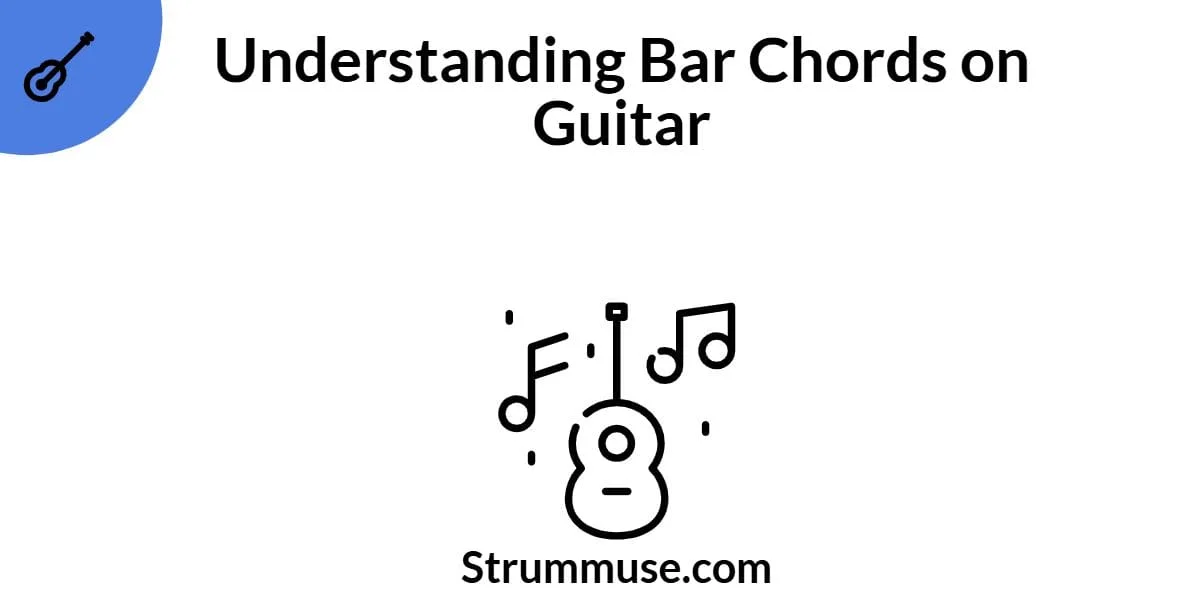Table of Contents
When I first heard the term “bar chords,” I thought, Uh-oh, this sounds serious. And honestly? It was. My fingers ached, the buzz from the strings wouldn’t go away, and I felt like giving up more than once. But the truth is—once you get them down, bar chords become your best friends on the fretboard.
Let’s walk through what they are, why they matter, and how you can actually enjoy learning them (yes, it’s possible!).
What Are Bar Chords?
A bar chord (sometimes spelled barre chord) is a chord where you use one finger to press down multiple strings across a single fret—like a mini capo made from your own hand.
They’re often moveable shapes that let you play chords all over the neck, unlike open chords that are stuck near the headstock.
Example: F major using the E shape:
- Index finger across all strings at 1st fret
- Ring finger on 3rd fret A string
- Pinky on 3rd fret D string
- Middle finger on 2nd fret G string
It looks intimidating but becomes second nature with practice.
Why Bar Chords Matter So Much
Here’s the thing: you can’t level up your guitar game without learning bar chords. Period.
From my experience, they unlock:
- Moveable chords: One shape = multiple chords
- More complex songs: Most Hindi and Western pop songs use them
- Finger strength: They train your hand muscles like no other
When I finally nailed my first F major bar chord, it felt like I had leveled up in a video game.
Basic Bar Chord Shapes You Should Know
Start with these two major shape families:
E-Shape Bar Chords (Root on 6th string)
This is like taking the open E major or E minor shape and barring it further up the neck.
- Example: F major (E shape at 1st fret)
A-Shape Bar Chords (Root on 5th string)
Based on open A major or A minor.
- Example: B minor (A minor shape barred at 2nd fret)
Tip: Learn one shape at a time. Play slowly and clearly. Bar chords aren’t about speed—they’re about accuracy and hand positioning.
How to Build Finger Strength for Bar Chords
Bar chords can be brutal in the beginning. But you don’t need superhuman fingers—you just need the right technique and daily reps.
Try these exercises:
- Finger pushups: Press and release strings slowly
- String presses without chords: Just bar and strum muted strings
- Gradual practice: Try for 5–10 minutes daily
If your hand gets sore, pause, stretch, and breathe. It’s a marathon, not a sprint.
Practice Progressions Using Bar Chords
Here’s what helped me break through:
- F – Bb – C – F (A classic pop sound)
- Bm – G – D – A (Common in romantic Hindi songs)
- Cm – Gm – Ab – Eb (Great for soulful or dramatic progressions)
Don’t just strum—feel the changes and experiment with rhythm.
Real Songs That Use Bar Chords:
Playing songs you love makes the hard stuff easier to swallow.
Common Beginner Problems (and Real Fixes)
Q: My chords sound buzzy. A: Try pressing closer to the fret, and make sure your barring finger is flat.
Q: My hand hurts! A: Don’t overdo it. Break your sessions into 5-minute chunks.
Q: I keep muting strings unintentionally. A: Adjust finger placement and wrist angle. Record yourself—it helps you spot mistakes you don’t hear live.
Also Read:- Things That Don’t Matter When You’re Learning Guitar- Guitar Tips
About Author: Why You Can Trust This Guide
At StrumMuse, I only write what I’ve experienced myself. No fluff, no guesses—just real tips that worked for me and thousands of learners like you.
- Experience: I struggled with bar chords too—and pushed through.
- Expertise: I’ve helped students master them step by step.
- Authoritativeness: Our lessons are based on years of hands-on learning.
- Trustworthiness: You’ll only get honest advice that supports your growth.
Final Strum
Mastering bar chords is a big step—and yes, it can be tough. But if you show up daily, even for just 10 minutes, you will get better.
Every buzzing string and tired wrist is part of the process. Stick with it, and soon, bar chords will feel like second nature.
Explore more helpful resources:
- All About Minor Chords
- All About Major Chords
- A Beginner’s Guide to Learning Guitar: Your First Steps in Music
Hello my name is Karansingh. I’m a passionate guitarist and the creator of StrumMuse.com — your trusted guide for Hindi guitar chords, strumming patterns, and beginner-friendly tutorials. With years of personal playing experience, I break down complex techniques into easy-to-follow lessons, helping you learn guitar the fun and effective way. Whether you’re just starting or refining your skills, StrumMuse is your musical companion.
Expertise: Bollywood guitar chords, strumming patterns, fingerstyle
Experience: 5+ years of self-taught guitar learning
Trust: 100+ curated posts helping thousands of learners
Contact: karanbayas0001@gmail.com
